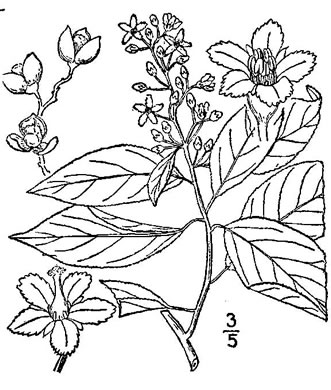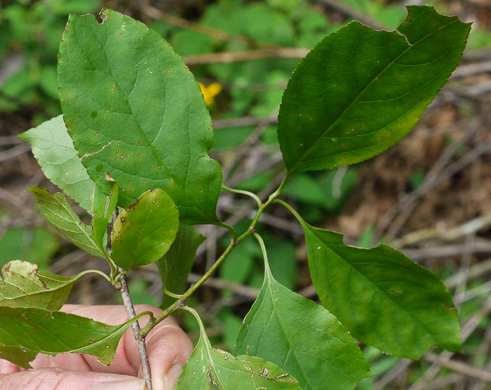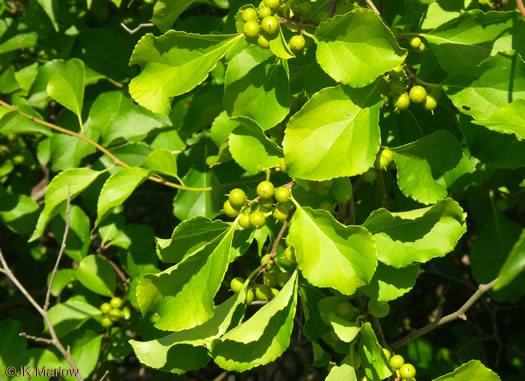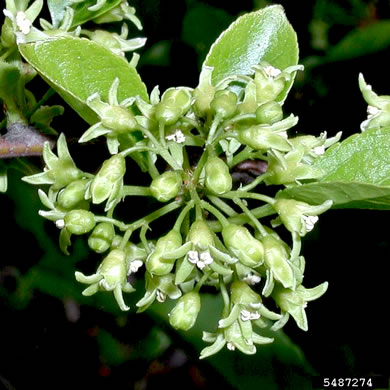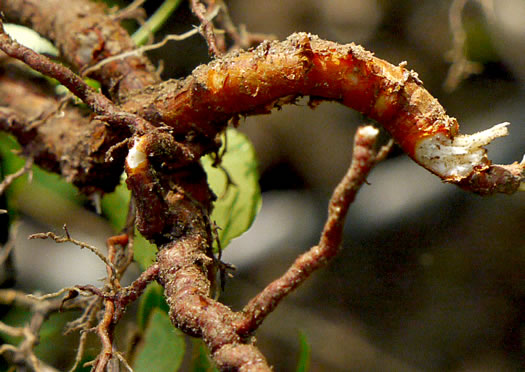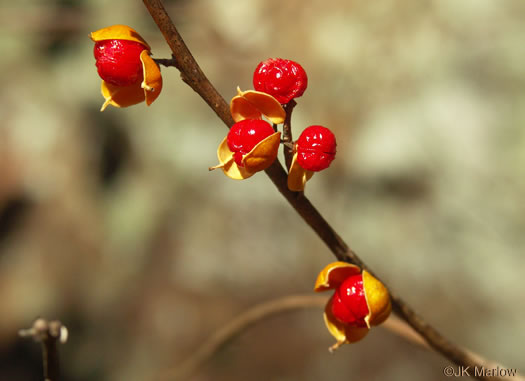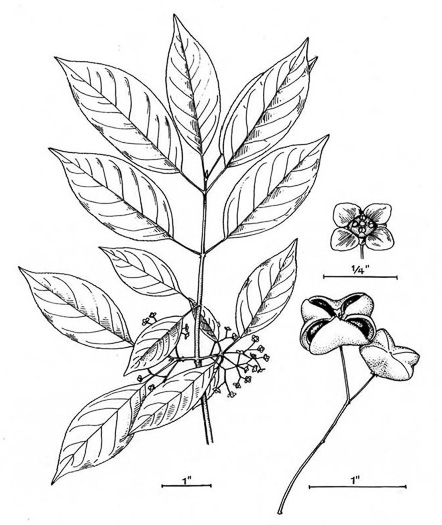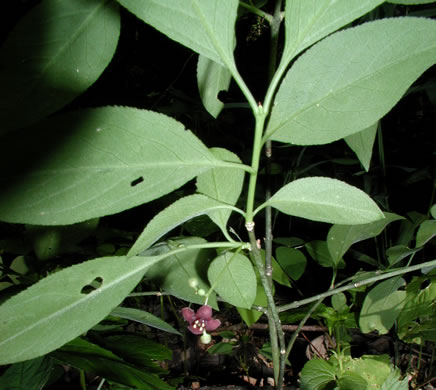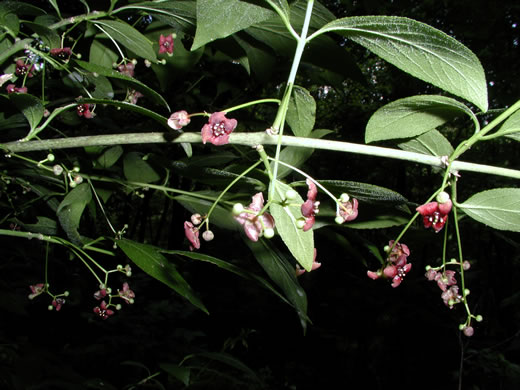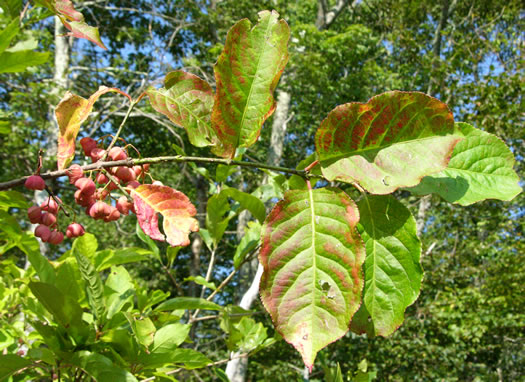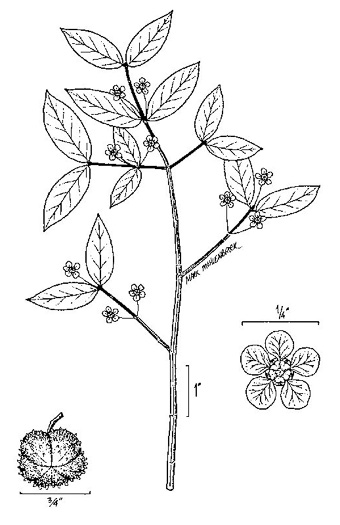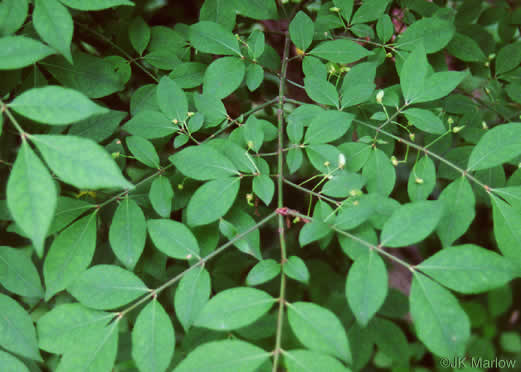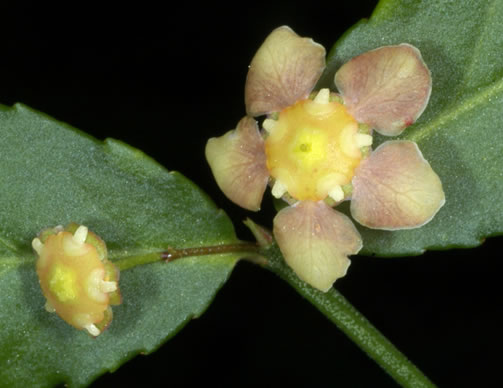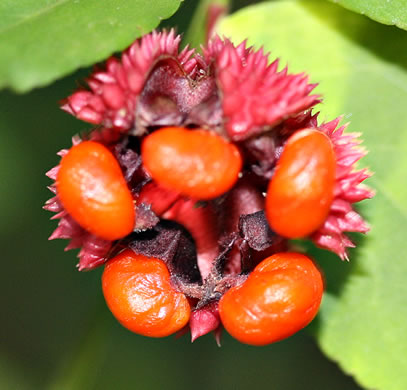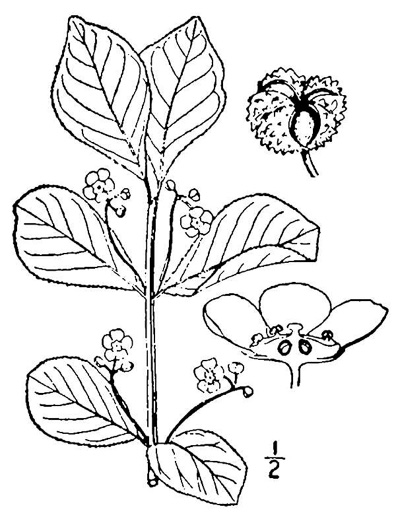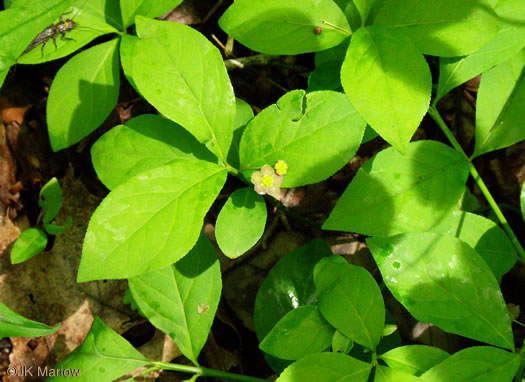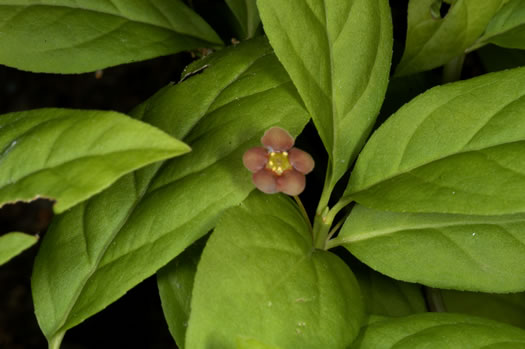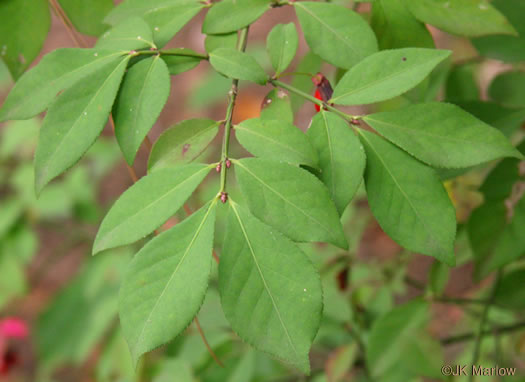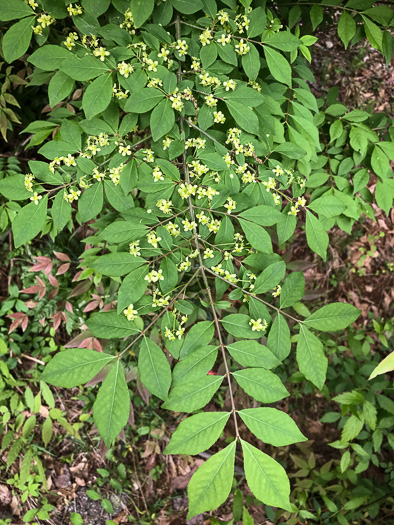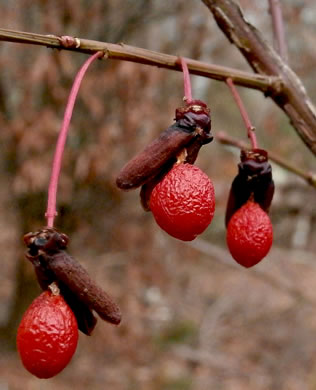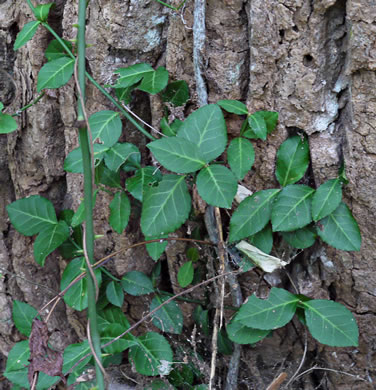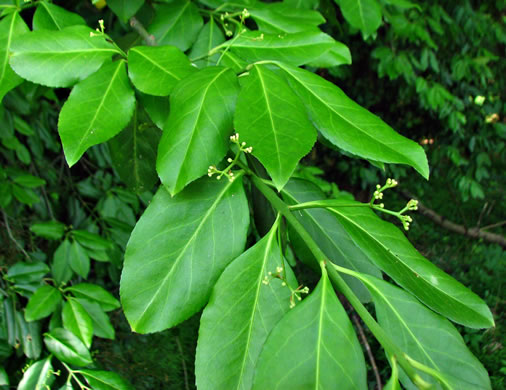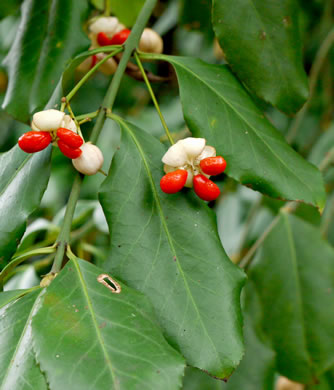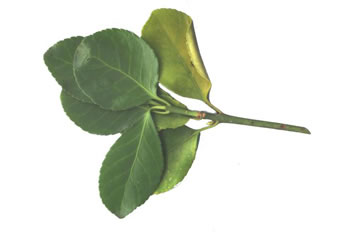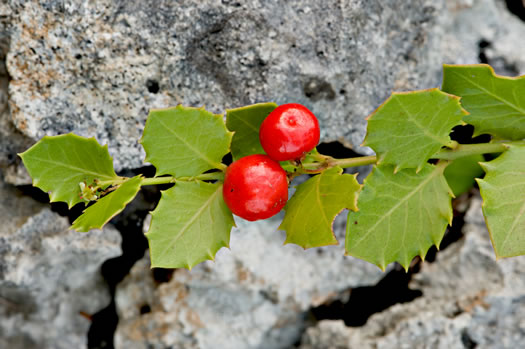Hovering over an image will enlarge it and point out features (works better on desktop than on mobile).
![]() A camera indicates there are pictures.
A camera indicates there are pictures.
![]() A speaker indicates that a botanical name is pronounced.
A speaker indicates that a botanical name is pronounced.
![]() A plus sign after a Latin name indicates that the species is further divided into varieties or subspecies.
A plus sign after a Latin name indicates that the species is further divided into varieties or subspecies.
Most habitat and range descriptions were obtained from Weakley's Flora.
Your search found 10 taxa in the family Celastraceae, Bittersweet family, as understood by PLANTS National Database.

![]()
![]() Common Name:
American Bittersweet
Common Name:
American Bittersweet
Weakley's Flora: (4/24/22) Celastrus scandens FAMILY: Celastraceae
SYNONYMOUS WITH PLANTS National Database: Celastrus scandens FAMILY: Celastraceae
SYNONYMOUS WITH Vascular Flora of the Carolinas (Radford, Ahles, & Bell, 1968): Celastrus scandens 113-01-001 FAMILY: Celastraceae
Habitat: Dry-mesic to mesic upland forests and woodlands, woodland and thicket margins, bluffs, riparian and bottomland forests, glade margins. Often on rich or somewhat alkaline soils
Rare
Native to the Carolinas & Georgia

![]()
![]() Common Name:
Oriental Bittersweet
Common Name:
Oriental Bittersweet
Weakley's Flora: (4/24/22) Celastrus orbiculatus FAMILY: Celastraceae
SYNONYMOUS WITH PLANTS National Database: Celastrus orbiculatus FAMILY: Celastraceae
SYNONYMOUS WITH Vascular Flora of the Carolinas (Radford, Ahles, & Bell, 1968): Celastrus orbiculatus 113-01-002 FAMILY: Celastraceae
Habitat: Bottomland and riparian forests, mesic upland forests and bluffs, glade margins, disturbed areas, thickets, roadsides, forests
Common in Mountains & NC Piedmont, uncommon in GA & SC Piedmont, rare in GA & SC Coastal Plain
Non-native: Asia

![]() Common Name:
Canby's Mountain Lover, Ratstripper, Cliff-green
Common Name:
Canby's Mountain Lover, Ratstripper, Cliff-green
Weakley's Flora: (4/24/22) Paxistima canbyi FAMILY: Celastraceae
SYNONYMOUS WITH PLANTS National Database: Paxistima canbyi FAMILY: Celastraceae
SYNONYMOUS WITH Vascular Flora of the Carolinas (Radford, Ahles, & Bell, 1968): Paxistima canbyi 113-02-001 FAMILY: Celastraceae
Habitat: On calcareous bluffs and cliffs (generally near the top of the cliffs or bluffs, rarely far below the crest), mostly on limestone and dolostone, but rarely on greenstone or shale; in NC naturalized at the site of a plant nursery and possibly also native (see discussion below)
Waif(s)
Native: north of the Carolinas

![]()
![]() Common Name:
American Wahoo, Eastern Wahoo, Burning Bush
Common Name:
American Wahoo, Eastern Wahoo, Burning Bush
Weakley's Flora: (4/24/22) Euonymus atropurpureus FAMILY: Celastraceae
INCLUDING PLANTS National Database: Euonymus atropurpureus var. atropurpureus FAMILY: Celastraceae
SYNONYMOUS WITH Vascular Flora of the Carolinas (Radford, Ahles, & Bell, 1968): Euonymus atropurpureus 113-03-001 FAMILY: Celastraceae
Habitat: Bottomland forests, riverbanks, mostly on rich alluvial sediments, or on slopes over mafic or calcareous rocks
Rare
Native to the Carolinas & Georgia

![]()
![]() Common Name:
Hearts-a-bustin', Strawberry-bush
Common Name:
Hearts-a-bustin', Strawberry-bush
Weakley's Flora: (4/24/22) Euonymus americanus FAMILY: Celastraceae
SYNONYMOUS WITH PLANTS National Database: Euonymus americanus FAMILY: Celastraceae
SYNONYMOUS WITH Vascular Flora of the Carolinas (Radford, Ahles, & Bell, 1968): Euonymus americanus 113-03-002 FAMILY: Celastraceae
Habitat: Mesic to submesic forests
Common
Native to the Carolinas & Georgia

![]()
![]() Common Name:
Running Strawberry-bush, Trailing Strawberry-bush, Trailing Wahoo
Common Name:
Running Strawberry-bush, Trailing Strawberry-bush, Trailing Wahoo
Weakley's Flora: (4/24/22) Euonymus obovatus FAMILY: Celastraceae
SYNONYMOUS WITH PLANTS National Database: Euonymus obovatus FAMILY: Celastraceae
SYNONYMOUS WITH Vascular Flora of the Carolinas (Radford, Ahles, & Bell, 1968): Euonymus obovatus 113-03-003 FAMILY: Celastraceae
Habitat: Cove forests, northern hardwood forests, other mesic forests, especially in boulderfields, where sometimes locally abundant
Uncommon in NC Mountains (rare elsewhere in GA-NC-SC)
Native to the Carolinas & Georgia

![]()
![]() Common Name:
Burning-bush, Winged Euonymus, Winged Wahoo
Common Name:
Burning-bush, Winged Euonymus, Winged Wahoo
Weakley's Flora: (4/24/22) Euonymus alatus FAMILY: Celastraceae
SYNONYMOUS WITH PLANTS National Database: Euonymus alatus FAMILY: Celastraceae
Habitat: Suburban woodlands, becoming invasive in parts of our region
Uncommon in Carolina Mountains, uncommon in Piedmont of GA & NC (rare elsewhere in GA-NC-SC)
Non-native: east Asia

![]()
![]() Common Name:
Wintercreeper, Climbing Euonymus, Chinese Spindle-tree
Common Name:
Wintercreeper, Climbing Euonymus, Chinese Spindle-tree
Weakley's Flora: (4/14/23) Euonymus fortunei FAMILY: Celastraceae
INCLUDING PLANTS National Database: Euonymus fortunei var. radicans FAMILY: Celastraceae
Habitat: Bottomlands, swamps, upland suburban woodlands
Uncommon in Carolina Piedmont (rare elsewhere in GA-NC-SC)
Non-native: China

![]() Common Name:
Japanese Spindle-tree, Japanese Euonymus
Common Name:
Japanese Spindle-tree, Japanese Euonymus
Weakley's Flora: (4/24/22) Euonymus japonicus FAMILY: Celastraceae
SYNONYMOUS WITH PLANTS National Database: Euonymus japonicus FAMILY: Celastraceae
Habitat: Disturbed areas, especially on barrier islands
Waif(s)
Non-native: Japan

![]() Common Name:
Holly-leaf Rhacoma, Christmasberry, Quailberry
Common Name:
Holly-leaf Rhacoma, Christmasberry, Quailberry
Weakley's Flora: (4/24/22) Crossopetalum ilicifolium FAMILY: Celastraceae
SYNONYMOUS WITH PLANTS National Database: Crossopetalum ilicifolium FAMILY: Celastraceae
Habitat: Pine rocklands, marl prairies, rockland hammocks; also, rarely and as an apparent waif, in disturbed, acid, peaty soil
Waif(s)
Native: peninsular Florida & the West Indies
Your search found 10 taxa. You are on page PAGE 1 out of 1 pages.

